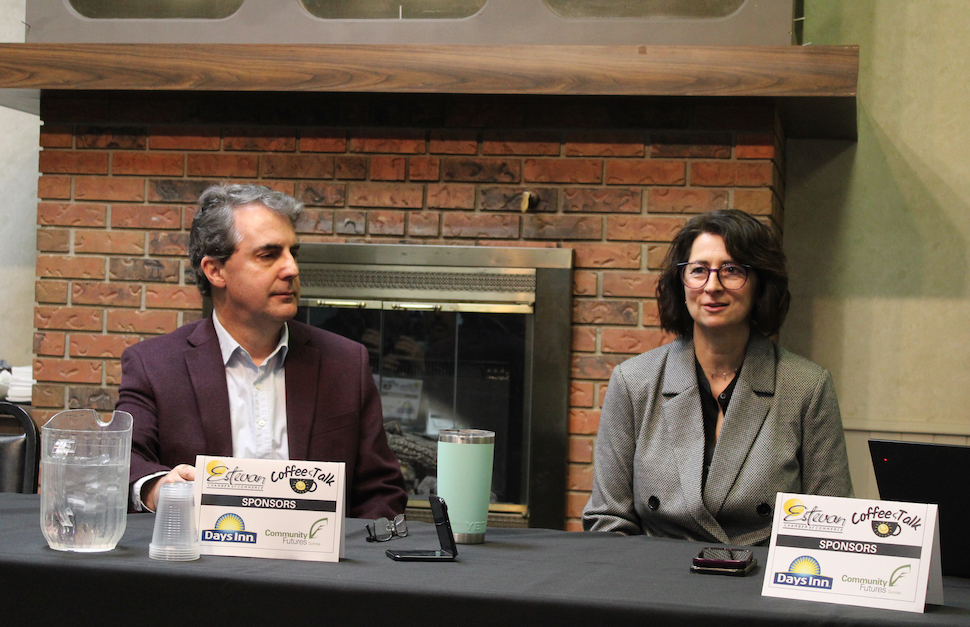At the latest edition of Coffee Talk, Gord More, Executive Director of the Southeast TechHub, and Tania Andrist, Executive Director of Innovation and Applied Research for the Centre of Sustainable Innovation at Southeast College, shared updates with the community. Both emphasized the importance of innovation and skills diversification for southeast Saskatchewan's future.
“We discovered a lack of digital literacy… and with support from the community and the tech hub, we launched our pilot computer science program,” Andrist explained. The program was designed to fill this gap and prepare students for a tech-driven economy.
The pilot program has already shown great promise. Students work on real-world projects that develop their technical skills while fostering critical thinking and problem-solving abilities. One early project involved developing a group matchmaking app for the ICED Rural Conference—providing students with valuable industry experience while contributing to a local event.
“This is what students in many programs don’t always get — real-world feedback,” said Andrist. She stressed the importance of students learning from industry professionals while still in their studies. For example, the matchmaking app was an opportunity for students to apply their classroom learning to solve a tangible community problem.
“The students take on the project that fits their skill level,” Andrist continued. “If someone is a beginner, they can start with simpler tasks, while others with more experience can take on leadership roles.”
This hands-on approach caters to students at all levels of experience, ensuring they can thrive and progress at their own pace. Returning students also benefit from continuity in their work, with many continuing projects from the fall semester.
“We have some new students, some continuing students, some beginners, and some with a lot of computer experience already. So that’s been excellent,” Andrist said.
Gord More, a key figure in the region's innovation efforts, emphasized that both the college program and the Southeast Tech Hub are crucial to diversifying the local economy. He stressed the need for community support and collaboration in this new era of tech and innovation.
A memorandum of understanding (MOU) with Weyburn and Coronach is currently in the works. The draft has already been created and is under review by the respective boards. A presentation will soon be made to Weyburn’s city council as well. This process is essential for advancing regional projects, including the tech hub and initiatives like the hydrogen project.
“We need to shift from being the disrupted to the disruptors. We have what it takes,” said More, reflecting his vision for the region to take an active role in technological innovation rather than just reacting to global trends.
“We can’t rely on government to solve our problems. The solution has to come from us,” More added, emphasizing that local action is key to long-term success.
He also underscored the importance of regional collaboration: “It takes a region to do something like this. 10,000 people can’t do this by themselves. It’s going to take 40-50 thousand people,” he said, highlighting the need for community-wide efforts to build a skilled workforce capable of solving modern challenges.
Andrist echoed More’s thoughts on community support: “We’ve had such great support from the community, including RBC, and it’s allowing us to create something special for students in this region.”
She also stressed the significance of real-world exposure. The program is deeply integrated with the community, allowing students to work with local businesses and organizations that present practical problems to solve. This collaboration ensures the curriculum remains relevant to current industry trends.
“We want our students to take the skills they’ve gained, go out into the world, solve problems, and come back to give back to their communities,” Andrist said, underscoring the goal of not just creating tech workers but community leaders.
Excitement is already building for the future of the computer science program. The winter semester has just begun, with nine new students enrolled, and Andrist is thrilled with their energy and enthusiasm.
“We’re so looking forward to the projects we’re going to be starting in the winter,” she said. The diverse mix of new and returning students will ensure that projects continue to build on the momentum from the fall.
As the Southeast Tech Hub continues to grow and partner with local businesses, the college’s role in providing high-quality education and hands-on experience will be crucial in building a skilled workforce in southeast Saskatchewan. Looking ahead, Andrist sees even more opportunities for students to learn and grow within the community, positioning Estevan as a key player in the tech industry.
